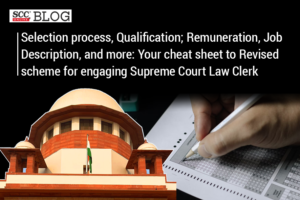The Chief Justice of India, Justice Dr DY Chandrachud, has approved the Scheme/Guidelines with respect to the engagement of Law Clerk-cum-Research Associates on short-term contractual assignment. The key highlights of the Scheme are:
(i) Law Clerks will be engaged for a term of one year, commencing from the re-opening of the Court after the summer vacation and concluding by the end of the following year’s summer vacation. This term may be extended for the succeeding year, subject to the satisfaction and approval of the Judge with whom the Law Clerk is attached.
(ii) The term of engagement of the Law Clerk posted in the Registry may be extended for the succeeding year, subject to the satisfaction of the seniormost Judge of the Committee of Judges on Law Clerks.
(iii) The Law Clerk cannot claim for regular appointment or continuance beyond the period of engagement in the Supreme Court of India.
(iv) A Law Clerk intending to leave assignment at an early stage shall be required to give prior notice in writing at least one month in advance.
(v) The engagement of a Law Clerk may be terminated by the Registry by giving two weeks’ notice.
(vi) Law Clerk will be paid a consolidated remuneration of Rs. 80,000/- per month for the assignment term and there will be no other allowances/perquisites. If a Law Clerk is given an extension after twelve months of the initial assignment, then a consolidated remuneration of Rs. 90,000/- per month will be paid for the extended assignment term and there will be no other allowances/perquisites.
(vii) The Chief Justice or a Judge shall be entitled to have services of four Law Clerks, out of which the first two shall be mandatorily through the selection process of the Registry. All four Law Clerks may also be selected through the selection process of the Registry. In case of heavy workload, a fifth Law Clerk may also be selected from the selection process of the Registry.
(viii) The candidates who could not clear the interview stage of selection process to be put in the Reserve Pool of qualified candidates as per the rank list and be engaged in the Registry to assist in various court processes as per the requirement and shall be given a contract of assignment. They may be engaged in a Judge’s office as and when required, for eg when a Judge is appointed to the Supreme Court during the middle of an ongoing term or needs a fifth Law Clerk or if a law clerk resigns mid-term.
Also, if a Judge retires during the middle of a Law Clerk’s term who was selected through the selection process of the Registry, then the Judge’s Law Clerks will be sent to the Reserve Pool, and their services may be utilized for various processes of the Court.
(ix) The candidates who are not engaged in a Judge’s office or are not put in the Reserve Pool of qualified candidates shall be assigned to a waitlist and may be considered for engagement as Law Clerks if there is any vacancy or need arises in a Judge’s office or the Registry. They will not be offered any contract of assignment or any remuneration for the period during which they are on the waitlist.
(x) Qualifications
a. A candidate must not be below the age of 20 years and above 30 years as on the final date for registration for the Law Clerks exam.
b. A Law Graduate having a Bachelor’s Degree in Law (including an Integrated Degree Course in Law) from any School/College/University/Institute established by law in India and recognized by the Bar Council of India for enrolment as an Advocate.
c. Candidates studying in the fifth year of the Five-Year Integrated Law Course or the third year of the Three-Year Law Course after graduation in any stream will also be eligible to apply, subject to furnishing proof of acquiring Law qualification before taking up the assignment as Law Clerk.
d. The candidate must have research and analytical skills, writing abilities, and knowledge of computers, including retrieval of desired information from various search engines/processes such as SCC Online, etc.
(xi) Selection process shall be conducted in three phases: Part I involving Multiple Choice Based Questions and Part II involving Subjective Written Examination and Part III- Interview by individual Judges. (ii) Part I and Part II shall be conducted on the same day in two sessions at the following centres across India i.e. Bengaluru, Bhopal, Bhubaneswar, Chandigarh, Chennai, Dehradun, Delhi, Gandhinagar, Guwahati, Hyderabad, Imphal, Jodhpur, Kolkata, Lucknow, Mumbai, Nagpur, Patna, Pune, Raipur, Ranchi, Srinagar, Thiruvananthapuram and Visakhapatnam.
(xii) Minimum 40% marks are required to be obtained to qualify for getting the Part II answer sheets checked. 50% marks are required to qualify Part II.
(xiii) Candidates qualifying Part I and Part II would be asked to submit a preference list of the Judges’ offices in a sequence of their choice under whom they intend to work.
(xiv) Based on the rank, a candidate shall be shortlisted for the final interview at a Judge’s office in terms of the preference indicated. A candidate higher in rank shall be duly considered for a Judge from the top of his preference list.
(xv) Job Description
a. Preparing brief summary of fresh admission matters;
b. Preparing a synopsis of regular hearing matters;
c. Sitting in the Court during the hearing of regular matters and noting down all the arguments;
d. Carrying out research work for assisting the Judge in preparation of draft judgments;
e. To assist the Judge in preparing speeches and academic papers;
f. To prepare headnotes of the judgments authored by the Judges, if required;
g. To perform any other work as directed by the Judge; and
h. A Law Clerk attached with the Registry shall undertake the tasks as directed by the supervising authority.
Read more details on the official notification of the Supreme Court, here.

